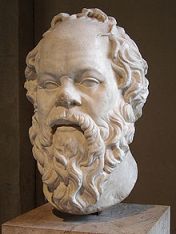Is there value in studying Socrates?
 Some suggest we should ditch the study of Humanities altogether, others are supportive, some just plain indifferent and scholars like Stanley Fish suggest that the study of humanities has no intrinsic value at all. Though we’ve all heard that the study of humanities is valuable for something, I happen to wholeheartedly agree, and there’s convincing research that supports this point of view — that cross-disciplinary study is of value. Most recently a study conducted at Harvard University found that,
Some suggest we should ditch the study of Humanities altogether, others are supportive, some just plain indifferent and scholars like Stanley Fish suggest that the study of humanities has no intrinsic value at all. Though we’ve all heard that the study of humanities is valuable for something, I happen to wholeheartedly agree, and there’s convincing research that supports this point of view — that cross-disciplinary study is of value. Most recently a study conducted at Harvard University found that,
“The further the problem [to be solved] from the solver’s expertise, the more likely they are to solve it,” K.R. Lakhini, Harvard Professor. [More on this later].
As the announcements of new online learning ventures multiply, though exciting, I am concerned that the possibility of the fading emphasis of studying such works as Plato’s Cave, Soren Kierkegaard’s Journals, Niccolo Machiavelli’s The Prince, and on and on we could go. What I am referring to is the study of humanities. I’m all for much needed reform – an accessible and relevant model for Higher Ed is needed, and I’ve written about promising initiatives recently. However, there appears to be an abundance of mathematics, and science topics within the open learning resources and open online universities, and it’s more than a little scant on the arts, history, literary studies and languages.
 If you peruse through Kahn Academy‘s over 3,200 video lectures [all quite excellent] – you’ll find the majority are related to math and science, (granted they are working on expanding the humanities side, and have even partnered with SmartArt), – or how about Udacity (granted the founder S. Thrun is a math genius), or MIT OpenCourseWare (granted it’s a Computer Science school) , and Open Lectures [granted newly launched]. Yet there are the bright spots, Cousera, [one of the newest open university course platforms] has a category devoted to Humanities and Social Sciences, (though only 5 courses so far), and Open Yale Courses which appears to offer a robust selection of history, art and language courses. Encouraging.
If you peruse through Kahn Academy‘s over 3,200 video lectures [all quite excellent] – you’ll find the majority are related to math and science, (granted they are working on expanding the humanities side, and have even partnered with SmartArt), – or how about Udacity (granted the founder S. Thrun is a math genius), or MIT OpenCourseWare (granted it’s a Computer Science school) , and Open Lectures [granted newly launched]. Yet there are the bright spots, Cousera, [one of the newest open university course platforms] has a category devoted to Humanities and Social Sciences, (though only 5 courses so far), and Open Yale Courses which appears to offer a robust selection of history, art and language courses. Encouraging.
Why study Humanities?
Though really, should we bother following the historic path of educating students in the Arts, History, Literature and such? Yes I believe so — and not just to produce a well-informed, literate, highly functioning citizen who makes solid contribution to his or her society, but because people who study a breadth of topics, and who have many interests are better problem solvers when they do. And, we have an abundance of problems that need solving.
 An interesting study done recently as mentioned, at Harvard Business School’s InnoCentive (similar to a ‘think tank’) by Professor Lakhani, analyzed hundreds of scientific problems posted by companies that for whatever reason had failed to solve. Lakhni found InnoCentive’s network solved nearly 30 percent of the problems, and that the more diverse the interests of the solvers, the more likely the problem was to be solved. Also fascinating – the study found that expertise [held by the problem solver] in the field of the problem, actually hurt a solver’s chances. (Ronsenberg, 2012).
An interesting study done recently as mentioned, at Harvard Business School’s InnoCentive (similar to a ‘think tank’) by Professor Lakhani, analyzed hundreds of scientific problems posted by companies that for whatever reason had failed to solve. Lakhni found InnoCentive’s network solved nearly 30 percent of the problems, and that the more diverse the interests of the solvers, the more likely the problem was to be solved. Also fascinating – the study found that expertise [held by the problem solver] in the field of the problem, actually hurt a solver’s chances. (Ronsenberg, 2012).
The Practical Side
This post points alludes to a broader topic which I won’t get into here, but mention briefly, is the purpose of higher education to become an educated individual who can think critically with breadth and depth, which may mean studying within various disciplines, OR is the purpose of higher education to focus on a vocational track and that leads to a specific job path and career? I’d like to say both – but they can be at cross purposes for a young college student. On this same vein, the Wall Street Journal reported this past week in ‘For most graduates a grueling job hunt Awaits‘, that the top 5 majors companies are hiring from this year are engineering, business, accounting, computer science, while [sadly] the majors being least hired were from social studies, humanities, agriculture, health science and education (Weber and Korn, 2012).
However, we DO need the scientists and engineers, and those that study social sciences, education and others, and within these groups the innovators, problem solvers, critical thinkers and risk takers to solve the problems at hand just as we have with every crisis that has presented itself in years of past.
In summary, I suggest we study humanities to…
- be creative problem solvers.
- be informed of history, the parallels to current problems in order to contribute to solutions that are relevant using sound knowledge and rationale.
- be able to think with depth and breadth, ask questions, think critically.
I hope we can work towards an OPEN and Online education model that offers humanities, science, mathematics, communication and the Arts that will educate a to produce a bright, informed and intellectual problem-solver.
Further Reading:
Prizes with an Eye towards the Future, Tina Rosenberg, The Opinionater
Why Colleges Don’t Teach the Federalist Papers, Peter Berkowitz, WSJ
Will the Humanities save Us? Stanley Fish, The Opinionater
Why are the Humanities important? Stanford University
Pingback: Why Socrates and Open Education should be Friends | Education Equipment | Educational News
By the way, I teach HS and college government. I just wrapped my first online class and struggle with making it interactive, challenging, and true to my concept of govt as a reflection of the human soul writ large (not unlike Plato’s republic)
LikeLike
Good job for tackling your first online class. It’s a daunting task, as it is so much different than face-to-face teaching, but having taken many online classes myself, they can be engaging, rigorous and satisfying. This series – http://online.cofa.unsw.edu.au/learning-to-teach-online/ltto-episodes is one of the best I’ve found for providing ‘bite size’ bits of teaching wisdom from professors who are teaching online themselves. Another option is a book called, Creating a Sense of Online Presence. Also quite good. Keep at it. Thanks for your posts and reading my blog!
LikeLike
One must also study the humanities to explore what a human being is outside of the fatalistic view presented by science. For example, electrons and protons don’t act morally, but we do. John Searle explores your topic in his Minds, Brains, and Science.
Plato had a better understanding of human existence than any scientist I’ve ever read or heard of.
I recently wrote a blog related to this topic entitled “pretending f’s are a’s” @ thrasymakos.wordpress.com
Nice blog!
LikeLike
Yes I agree! I find it interesting to read works from the great philosophers and find so much wisdom. I’ll look into the John Searle’s book. Thanks for your comments, sharing your thoughts and resources!
LikeLike